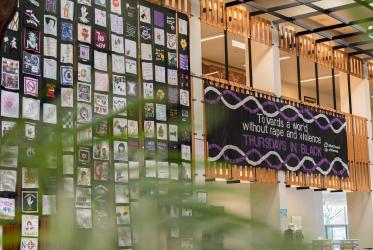The WACC-SIGNIS Human Rights Award 2016 has gone to the documentary film Cahier africain directed by Heidi Specogna, who was recognized at an awards ceremony on 19 February in Berlin.
WACC, or the World Association for Christian Communication, and SIGNIS, a worldwide association of Catholic communicators, recognized the documentary for offering an exemplary human perspective on the horror of conflict situations that impact the lives of ordinary people, especially women and children.
Cahier africain begins with the discovery of a small school exercise book, containing the testimonies of 300 Central African women, girls and men. The notebook’s pages reveal how they suffered at the hands of Congolese mercenaries between October 2002 and March 2003.
Filmed from 2008 onwards, Cahier africain accompanies victims of the violence, such as Amzine who gave birth to a daughter after being raped, and Fane, who was shot in the knee and who eventually underwent successful surgery in Berlin.
As prosecution of the war crimes continues in the International Criminal Court in The Hague, the women attempt to go about their daily lives. Then another civil war breaks out in the Central African Republic.
Specogna notes: “The fate of the women and their children begotten by force is a tragedy the world turns a blind eye to. It’s estimated that, in the Central African region in recent years alone, more than 100,000 women have been violated during armed conflict. By way of comparison, after the Rwandan genocide approximately 20,000 children came into life with this background.”
Rev. Dr Julia Helmke, President of Interfilm, said in her remarks “Film is all about communication and communication rights.” Helmke underlined that the Cahier africain is an excellent example of that and she especially mentioned the meetings with the refugees in the film.
Helmke also mentioned that Cahier africain won the 2017 Swiss Film Award for best documentary. In 2016, the Interreligious Jury at DOK Leipzig – one of the oldest documentary festivals in the world - awarded its prize to Cahier africain, which also won a Silver Dove for the best film on democracy and human rights.
WCC director of communication and vice president of WACC Europe Marianne Ejdersten spoke at the ceremony. “Communication belongs at the heart of being on a Pilgrimage of Justice and Peace,” she said. “We cannot give an account of the reality around us, or articulate our hope if we are not communicating this to one another and to the world.”
Cahier africain is an excellent example of a form of communication for justice and peace, Ejdersten continued. “Prophetic communication via culture or film opens alternative horizons not limited to the perspectives imposed by the dominant culture, and empowers individuals and communities to tell their own stories and to craft their images and gestures,” she said. “Communication is also a peace-building tool.”
It’s far too easy to lose hope in the world, Ejdersten concluded. “But that's not an option,” she said. “We therefore need to seek strength and protect ourselves by laughing more, love more, crying more, exposing ourselves more to challenges. Quite simply, we need more strong and prophetic films.”
WACC press release 13 April, 2017
Opening address by WCC director of communication, 19 February 2018
Nev.it: Cinema. Va a “Cahier africain” il Premio per i diritti umani di WACC-SIGNIS









